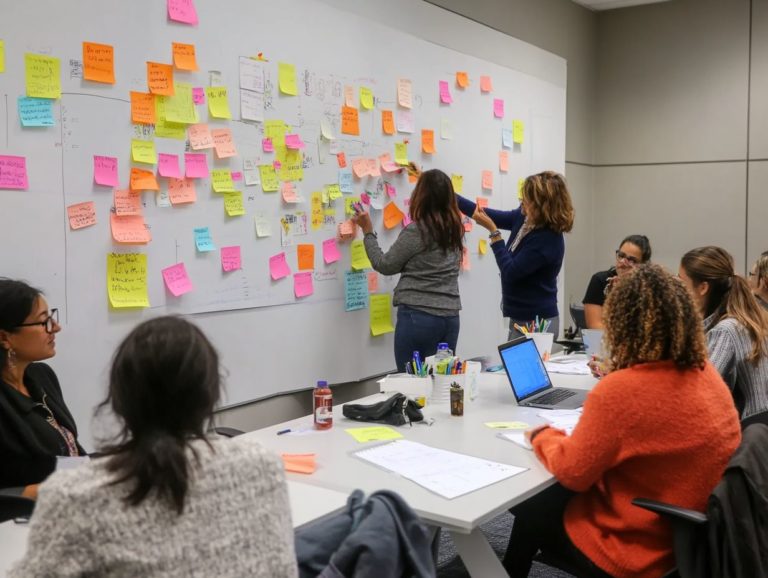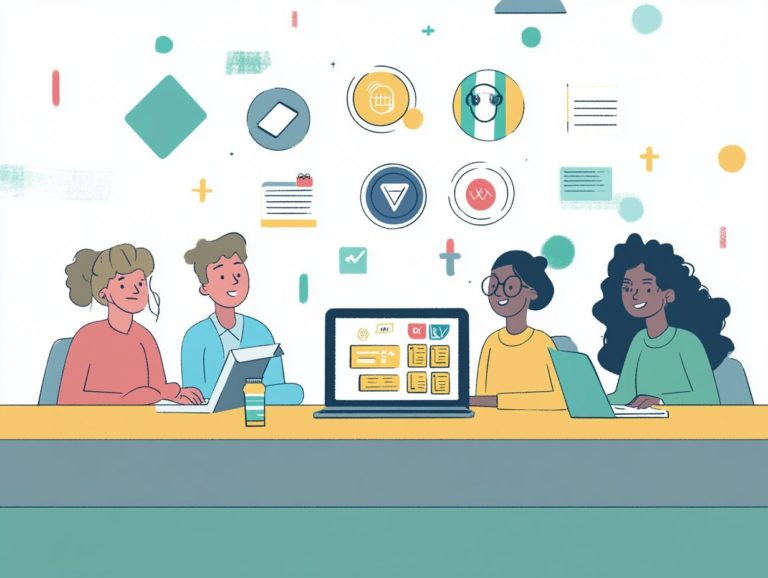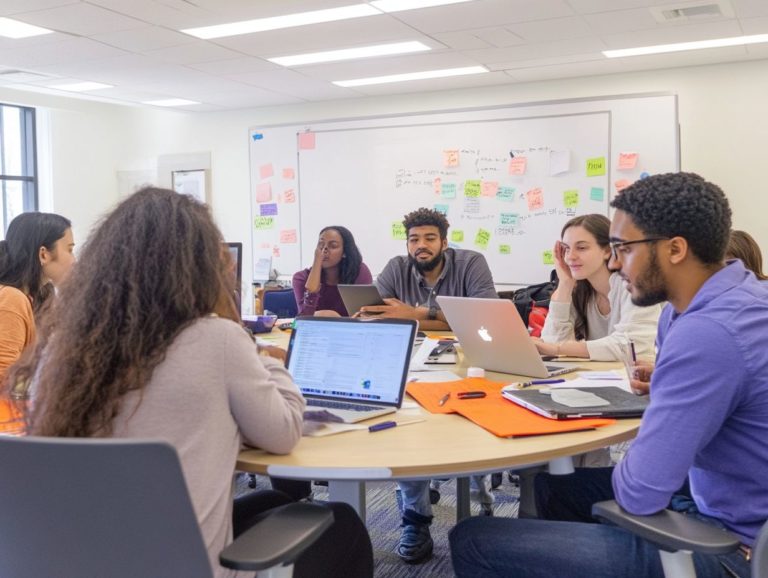Top 5 Skill Enhancement Techniques for Professionals
In today s fast-paced work environment, staying ahead demands more than simply managing daily tasks. You must actively pursue ongoing learning to truly thrive and adapt.
This article delves into five essential techniques for boosting your skills: continuous learning, effective networking, seeking constructive feedback, mastering time management, and embracing creativity.
By implementing these strategies, you can pinpoint skill gaps, strengthen your professional relationships, and prepare for future challenges.
Get ready to unlock your potential!
Contents
- Key Takeaways:
- 1. Continuous Learning and Upskilling
- 2. Networking and Building Professional Relationships
- 3. Seeking Feedback and Constructive Criticism
- 4. Time Management and Prioritization
- 5. Embracing Creativity and Innovation
- How Can Professionals Identify Their Skill Gaps?
- What Are the Benefits of Continuous Learning and Upskilling?
- How Can Networking Help in Skill Enhancement?
- Why Is Feedback Important for Professional Growth?
- What Are Some Time Management Techniques for Professionals?
- How Can Creativity and Innovation Be Incorporated into Daily Work?
- What Are the Challenges of Skill Enhancement for Professionals?
- How Can Companies Support Their Employees’ Skill Enhancement?
- What Are the Future Skills That Professionals Should Focus On?
- How Can Professionals Stay Motivated to Continuously Enhance Their Skills?
- What Are Some Common Mistakes to Avoid in Skill Enhancement?
- Frequently Asked Questions
- What are the top 5 skill enhancement techniques for professionals?
- Why is continuous learning important for professionals?
- How can networking help enhance professional skills?
- What is the significance of goal setting in skill enhancement for professionals?
- How does feedback and self-reflection contribute to skill enhancement for professionals?
- Why is time management an important skill for professionals to enhance?
Key Takeaways:

- Ongoing learning is essential for professionals to stay relevant and competitive in their field.
- Networking and building professional relationships can open up opportunities for skill enhancement and career growth.
- Seeking feedback and constructive criticism helps identify and improve skill gaps.
1. Continuous Learning and Upskilling
In today s fast-paced work environment, ongoing learning is essential for enhancing job performance and maintaining a competitive edge, especially given the challenges brought on by COVID-19. Both organizations and professionals are increasingly recognizing the importance of in-demand skills such as emotional intelligence (the ability to understand and manage your emotions and those of others), critical thinking, and effective communication.
By investing in professional development programs such as those offered by Harvard Business School or BetterUp you can help cultivate a culture of growth that greatly elevates morale and productivity. For instance, courses that focus on emotional intelligence not only enable better connections with colleagues but also sharpen leadership capabilities.
When you feel valued and supported through personalized learning paths, you re more likely to engage wholeheartedly in your role, driving impressive performance and fostering loyalty to your organization. Embrace continuous growth to tackle future challenges and foster an innovative environment!
2. Networking and Building Professional Relationships
Networking and cultivating professional relationships are crucial for advancing your career. They enhance your communication skills and foster employee engagement, establishing strategic business relationships vital for effective organizational leadership.
By developing strong connections, you can significantly influence your career trajectory, gaining access to invaluable resources, mentorship opportunities, and critical industry insights. Platforms like LinkedIn play a pivotal role in this effort, allowing you to showcase your skills and expand your network with like-minded professionals across various industries.
Nurturing these relationships contributes to a culture of collaboration and innovation, supporting refined business strategies and effective decision-making within your organization. This dynamic boosts your individual confidence and enhances team performance, creating a more cohesive and driven workplace.
3. Seeking Feedback and Constructive Criticism
Seeking feedback and constructive criticism is essential for your professional growth. It nurtures a culture of open communication while enhancing your critical thinking and problem-solving abilities, leading to greater employee engagement.
When organizations prioritize feedback, they cultivate a vibrant environment where you feel valued and heard. This ongoing dialogue sharpens your performance and fortifies team cohesion.
Research from the Harvard Business Review highlights that high levels of employee engagement are often found in workplaces that encourage input and reflection. Evaluating feedback processes ensuring they are regular, actionable, and respectful can significantly elevate your motivation and productivity.
By actively seeking perspectives from your coworkers and supervisors, you align your personal goals with the company’s mission, paving the way for your career advancement and the organization s success.
Don’t wait start building your network today!
4. Time Management and Prioritization
Effective time management and prioritization are essential skills that can improve your skills at work and enhance your productivity. They help you make informed decisions and optimize your job performance.
By using techniques like the Eisenhower Matrix, which helps you decide what tasks to do first, the Pomodoro Technique, a method of working in short bursts followed by breaks, and time blocking, you can use your time more efficiently. These methods help you distinguish between urgent and important tasks so you can allocate your resources wisely and minimize procrastination.
Good prioritization makes your work easier and hones your decision-making skills. You ll learn to assess situations quickly and choose the best course of action. Ultimately, mastering time management leads to improved workplace efficiency, creating an environment where you and your team can thrive and achieve your goals.
5. Embracing Creativity and Innovation
Embracing creativity and innovation is essential for you as a professional who wants to improve problem-solving skills and strategic thinking. This approach boosts your performance and helps your business strategy.
Integrating fresh perspectives into your daily tasks allows you to escape old, limiting patterns. Simple changes, like hosting brainstorming sessions, encouraging diverse viewpoints, or trying out new tools, can lead to unexpected solutions and innovative approaches. This cultivates a more engaging work environment and enables your team to tackle challenges with renewed enthusiasm.
An innovative mindset lets you think outside the box, leading to breakthroughs that can significantly boost productivity and collaboration. This drives your organization toward greater success.
How Can Professionals Identify Their Skill Gaps?
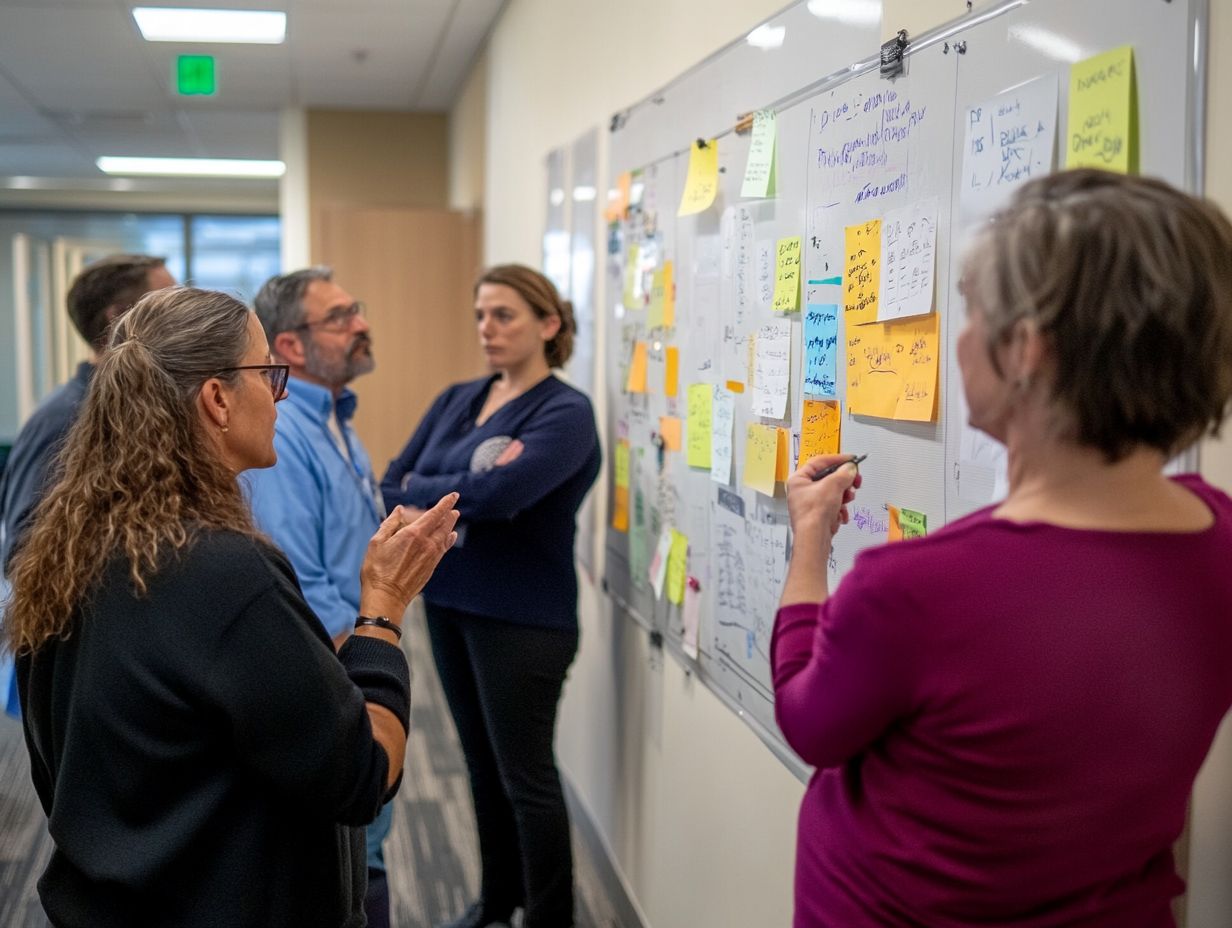
Identifying your skill gaps is vital for your growth! It allows you to channel your learning efforts effectively and enhance your workplace learning and analytics skills.
To do this, consider self-assessments to evaluate your skills and competencies. Seeking constructive feedback from peers, mentors, or supervisors can also provide valuable insights into areas that need improvement.
Performance reviews help pinpoint gaps, revealing discrepancies between your expected and actual performance. By recognizing these skill shortages, you can create focused development plans that foster your personal growth and increase your value within your organization.
What Are the Benefits of Continuous Learning and Upskilling?
Continuous learning and upskilling offer many advantages, such as heightened employee engagement, improved job performance, and a competitive edge through essential skills for your career growth.
Research from the Harvard Business Review shows that organizations with a learning culture see significant boosts in employee satisfaction and retention rates. This transformation elevates morale and sparks greater innovation, as team members feel encouraged to share fresh ideas.
McKinsey & Company found that businesses prioritizing continuous learning are 46% more likely to lead the market with new products. This shows how learning initiatives lead to success in the market.
Investing in ongoing education allows you to expand your skills and take charge of your career in a dynamic job market that demands adaptability and skill.
How Can Networking Help in Skill Enhancement?
Networking is essential for enhancing your skills by cultivating professional relationships that facilitate knowledge sharing and collaboration. This significantly promotes your overall engagement and growth.
In today s fast-paced work environment, mastering effective networking strategies is critical. Platforms like LinkedIn act as vibrant arenas for you to connect with fellow professionals.
Utilizing LinkedIn allows you to showcase your skills, engage with industry peers, and tap into a treasure trove of resources. This broadens your knowledge base and opens doors for mentorship opportunities, enabling you to develop new competencies.
With supportive connections, you can seek advice, collaborate on projects, and boost your visibility in the job market. Thus, networking is the cornerstone of professional success! Start networking today to unlock new opportunities!
Why Is Feedback Important for Professional Growth?
Feedback plays an important role in your professional growth by offering valuable insights that sharpen your critical thinking and problem-solving abilities. This boosts your engagement and overall job satisfaction.
Understanding the different types of feedback formative (given during the learning process to improve skills), summative (assessing performance at the end of a cycle), and peer helps you identify your strengths and pinpoint areas for improvement.
Constructive criticism acts as a catalyst for your personal development. It fosters open dialogue that clarifies expectations. When you receive thoughtful feedback, you re likely to feel more engaged and motivated to enhance your skill set.
This continuous cycle of feedback creates an environment ripe for learning and elevating performance levels. It cultivates a more cohesive workplace culture!
What Are Some Time Management Techniques for Professionals?
Effective time management techniques can elevate your productivity and sharpen your decision-making skills. This allows you to prioritize tasks with finesse and enhance your overall learning experience in the workplace.
By using strategies like the Eisenhower Matrix, a method to help you decide what tasks are most important, you can easily distinguish between what s urgent and what s truly important. This approach reduces the stress associated with last-minute deadlines while encouraging a proactive mindset toward your work.
The Pomodoro Technique is another valuable method, promoting short, focused bursts of work interspersed with brief breaks. This rhythm helps sustain your energy levels and maintain mental clarity throughout the day.
Combined, these methods create a structured framework that amplifies your output and nurtures a more thoughtful and strategic approach to managing your responsibilities!
How Can Creativity and Innovation Be Incorporated into Daily Work?
Incorporating creativity and innovation into your daily work routines can significantly enhance your problem-solving skills and strategic thinking. This ultimately boosts employee engagement and job performance.
Embracing practices like regular brainstorming sessions allows you and your team to collaboratively explore unconventional ideas and solutions. Utilizing creative problem-solving techniques encourages you to think beyond the obvious, tackling challenges from fresh perspectives.
Cultivating an open-minded work culture is essential for success! It creates an environment where diverse viewpoints are welcomed, sparking dialogue and innovative thought. When you feel free to express your unique ideas without the fear of judgment, you’re more likely to contribute meaningfully, driving collective success for everyone involved.
What Are the Challenges of Skill Enhancement for Professionals?
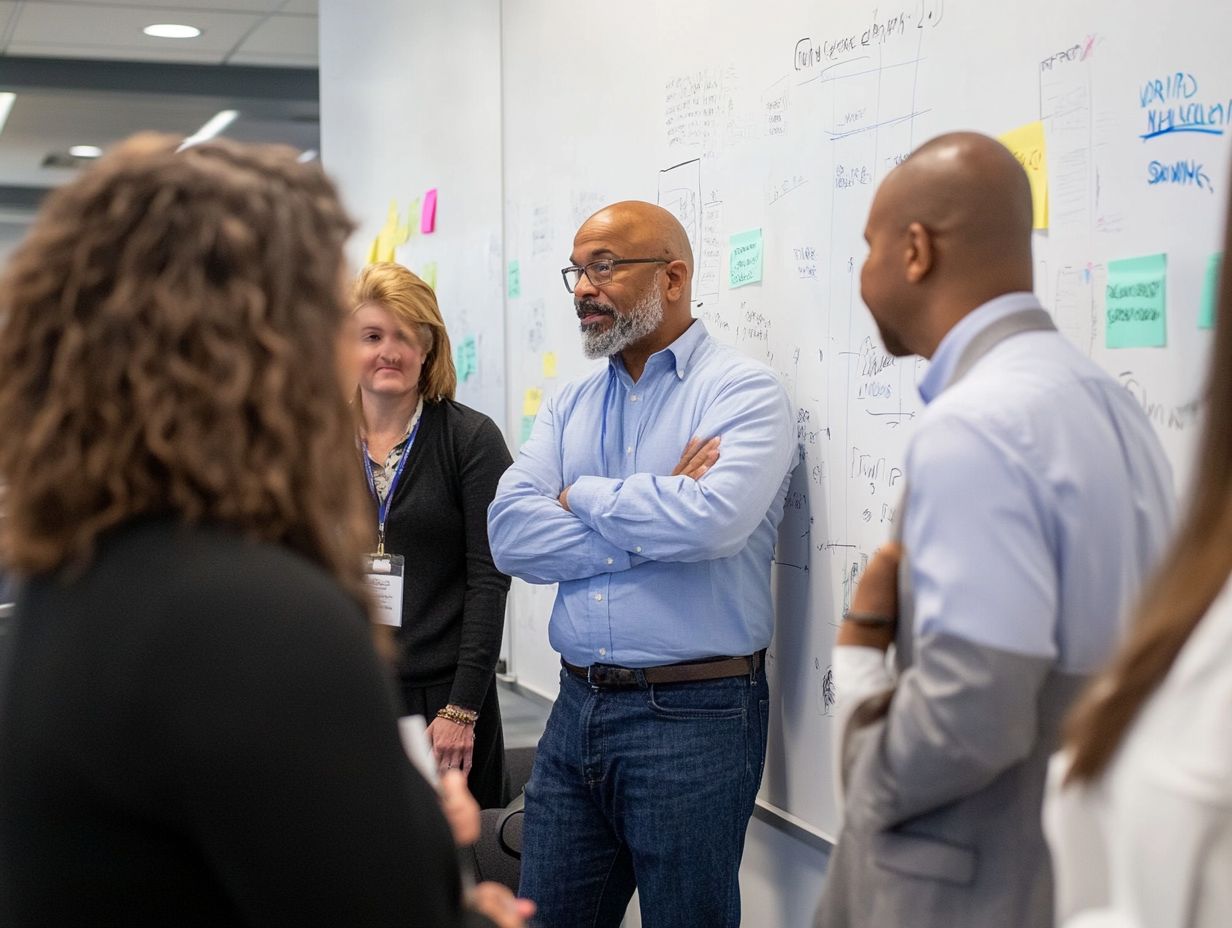
Skill enhancement presents various challenges for you as a professional, including resistance to change, limited resources, and the struggle to apply newly acquired skills effectively in workplace settings.
These obstacles can often impede your personal and professional growth. It s crucial to recognize and embrace new ideas! To tackle this, cultivating a culture of open communication can significantly help in overcoming resistance.
Exploring online courses or participating in community workshops can effectively address resource shortages. Practicing through real-life scenarios or seeking peer feedback can greatly enhance retention.
Ultimately, your ability to adapt and utilize available resources will be pivotal in navigating these challenges, transforming skill enhancement into a rewarding journey.
How Can Companies Support Their Employees’ Skill Enhancement?
You can play a pivotal role in your employees’ skill enhancement by providing them with resources and opportunities for professional development. These are essential for effective organizational leadership and a thriving workplace culture.
By implementing comprehensive training programs, you equip your team with the latest industry knowledge and skills. Fostering mentorship opportunities allows experienced employees to share invaluable insights and guide newer members, creating a robust support system within your organization.
Workshops focused on specific skill sets, such as communication or project management, contribute to building a more competent workforce. These initiatives not only elevate individual performance but also nurture a collaborative environment where everyone feels valued and enabled to grow.
What Are the Future Skills That Professionals Should Focus On?
As the workforce landscape continues to evolve, you should focus on acquiring future skills that are increasingly in demand, such as emotional intelligence (the ability to understand and manage your own emotions and those of others), strategic thinking, and advanced analytics.
Your ability to adapt to technological changes and navigate complex data will distinguish you in a competitive job market. Cultivating creativity and cultural intelligence will further enhance your attractiveness to potential employers.
To navigate this ever-shifting terrain, you can leverage various resources like online courses, workshops, and networking events that provide real-time insights into market trends. Staying informed about emerging fields, such as artificial intelligence and digital marketing, is essential for developing these necessary competencies.
By adopting a proactive approach to skill development, you enable not only your career trajectory but also equip yourself to thrive in a collaborative and diverse workplace.
How Can Professionals Stay Motivated to Continuously Enhance Their Skills?
Staying motivated to continuously enhance your skills is essential for your professional journey, as it fosters greater job satisfaction and boosts engagement through proactive development and effective goal setting.
One effective strategy is to set achievable goals that break down larger objectives into manageable steps. This gives you a sense of accomplishment along the way. Tracking your progress can serve as a powerful motivator; you’ll be able to visually appreciate how far you ve come while pinpointing areas ripe for improvement.
Engaging with mentors and peers can also spark inspiration, providing valuable insights and encouragement that reinforce your determination to stay on track. By cultivating these habits, you can maintain your enthusiasm and drive to excel in your career.
What Are Some Common Mistakes to Avoid in Skill Enhancement?
Avoiding common mistakes in skill enhancement is essential for professionals. Missteps can significantly hinder your progress and undermine your development efforts.
Neglecting to seek and implement constructive feedback can lead to stagnation. Ineffective time management may detract from your ability to practice consistently and learn effectively. Without a structured learning plan, your efforts might become scattered, yielding minimal results.
To counter these pitfalls, actively solicit insights from peers or mentors to pinpoint areas for improvement. Try using time-blocking, which means scheduling specific blocks of time for tasks, to sharpen your focus and ensure dedicated practice time.
Craft a detailed learning plan with clear objectives and milestones. This will streamline your journey, guiding you efficiently toward your skill enhancement goals.
Frequently Asked Questions
What are the top 5 skill enhancement techniques for professionals?
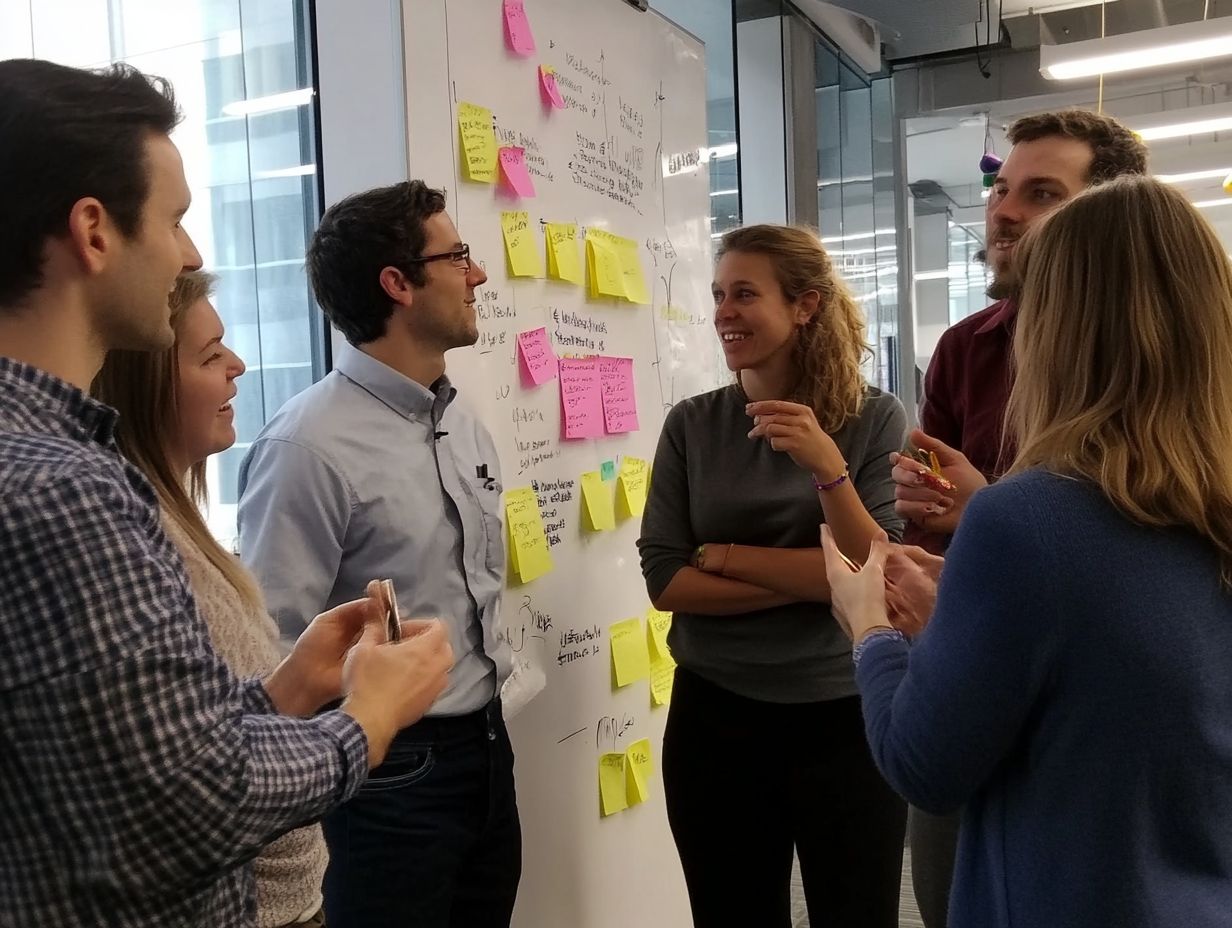
The top 5 skill enhancement techniques for professionals are continuous learning, networking, goal setting, feedback and self-reflection, and time management.
Why is continuous learning important for professionals?
Continuous learning allows professionals to stay updated with industry trends. It sharpens their skills and helps them adapt to changing market demands, making them more valuable to potential employers.
How can networking help enhance professional skills?
Networking provides opportunities to learn from others, build relationships, and gain new insights and perspectives. These can all contribute to the growth and improvement of professional skills.
What is the significance of goal setting in skill enhancement for professionals?
Setting clear and achievable goals helps professionals focus their efforts, stay motivated, and measure their progress. This leads to continuous growth and development of their skills.
How does feedback and self-reflection contribute to skill enhancement for professionals?
Feedback and self-reflection allow professionals to identify their strengths and weaknesses. They can make necessary improvements and strive for continuous growth and improvement in their skills.
Why is time management an important skill for professionals to enhance?
Mastering time management can supercharge your productivity and lead to a better work-life balance!


